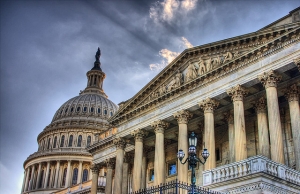
How to Save the Voice of America and U.S. International Broadcasting
Reprinted from the CPD Blog by Alex Belida
Deputy Secretary of State William Burns recently offered some parting thoughts for American diplomats as he retired after serving more than three decades in the Foreign Service. Many of his ideas for confronting the diplomatic challenges of the future are relevant to the tests facing the Voice of America and the other entities of U.S. international broadcasting. The greatest of these is, as Burns writes in Foreign Policy, “how can we add value in a world of instant and nearly universal access to information?”
The current debate on that question appears to be taking two tracks, neither of which is desirable. On one side, there is a push by some in Congress for reform legislation that threatens the journalistic integrity of taxpayer-funded USIB outlets. On the other side, some are suggesting VOA and its sister stations have outlived their usefulness and now may be the time to shut them down.
To paraphrase Burns, the real question is not whether VOA and USIB are still relevant but how they can be sustained, strengthened, and adapted for a new century.
Here are my interpretations of his relevant suggestions:
1. Know where you come from:
“We cannot afford to forget where we come from, whom we serve, and whom we represent,” Burns writes.
Employees must understand they work for the United States and the American people – not just the current administration or Congress or ethnic or other interest groups who want to shape content. VOA and USIB must remain non-partisan and hew to a course of accurate, objective and comprehensive news reporting and programming. This is reflective of a fundamental American value: that a free press and the free flow of information are essential to democracy. The future of USIB cannot be assured by pursuing a course of blatant pro-American propaganda and constant critiques of U.S. rivals such as Russia, China and Iran. (Non-citizens hired to work for VOA and USIB must understand this.)
2. It’s not always about us:
“Other people and societies have their own realities, not always hospitable to ours. That does not mean that we need to accept those perspectives, or indulge them, but understanding them is the key to sensible diplomacy,” Burns writes.
VOA cannot be restricted to reporting about the United States, its policies and officials alone as the Congressional reform legislation proposes. It must remain engaged globally with reporters based around the world. Reporting on events inside Russia or China or Iran does not represent endorsement of their governments or policies. Similarly, USIB entities like Radio Free Asia, Radio Free Europe and the Middle East Broadcasting Network cannot succeed if they report solely on the countries they target and ignore the United States and its official policies. (To ensure a coordinated, global and economical approach to programming, it would be best to consolidate the entities into a single outlet under the best known and oldest brand, VOA.)
3. Master the fundamentals:
Today’s USIB executives, like their younger staffers, must understand how to use all the tools of communication – from the latest satellite technology to the current most popular digital devices. USIB executives must deliver content to audiences via whatever route those audiences choose. However, a focus on the means of program delivery over the content of programs is a prescription for irrelevance. To attract audiences, USIB entities must offer up programming that is unique and compelling. Matching what other major international news media offer is another prescription for irrelevance.
4. Stay ahead of the curve:
Burns writes: “While the fundamentals are essential, they are not enough. American diplomats [USIB executives] have to stay ahead of the curve -- ready to adapt to new challenges and innovations and ready to lead in emerging arenas of competition and cooperation.”
Following emerging trends in communications once others have pursued them means always being late and losing audiences. Innovation needs to be an essential component of USIB in the future.
5. Connect leverage to strategy:
“Successful diplomacy [international broadcasting] has to begin with strategic vision, a concept for shaping international order in the service of American interests,” Burns writes.
Members of Congress (as well as the President) need to set aside partisan differences and agree that the simplest and most effective global communication strategy for advancing U.S. interests is one that promotes a free and critical press. This is an essential ingredient for democracy and human rights. VOA and USIB must be free and when necessary report critically about U.S. officials, policies and events without fear of reprisals.
6. Accept risk:
Burns writes: “Secretary of State Dean Acheson once complained that senior diplomats tended to be "cautious rather than imaginative." Most of his successors have harbored similar concerns, some more openly than others.”
USIB executives need to visibly demonstrate their support for risk-taking in innovative programming, including enterprise reporting. Some ventures may succeed. Some may fail. But failure should not be punished. Innovation and enterprise reporting need to be incentivized.
7. Speak truth to power:
Burns says U.S. diplomats “are obliged to exercise discipline and avoid public dissent. But they also have a parallel obligation to express their concerns internally and offer their best policy advice, even if the truths they perceive are inconvenient.”
Instead of listening only to the ideas of a select few on Capitol Hill or in the administration or just pursing their own plans, USIB executives need to listen to the voices of their own staffers, employee unions, retirees and other interested parties, including audiences. They need to stand behind their personnel even in the face of official critiques and demands.
Most Read CPD Blogs
-
January 29
-
January 20
-
January 28
-
January 2
-
January 8
Visit CPD's Online Library
Explore CPD's vast online database featuring the latest books, articles, speeches and information on international organizations dedicated to public diplomacy.









Add comment